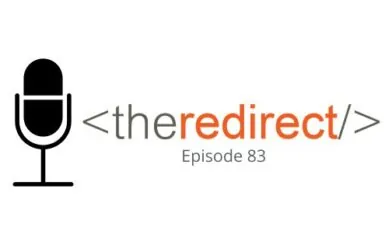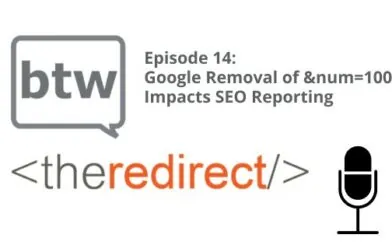Episode 39 / March 23, 2018
Listen now:
Welcome to The Redirect Podcast, where the BlackTruck team shares recent insights and takeaways from the world of search marketing.
In this week’s episode:
- Tips from the team on what to evaluate and take action on as Q1 wraps up (begins at 1:05).
- Patrick’s skepticism of the future of smart devices continues (begins at 4:38).
- The need for marketers to separate the concepts of voice search and voice assistants (begins at 10:56).
- Google has announced Actions for Google Shopping and Google Assistant (begins at 16:15).
- Combating negative online reviews (begins at 24:50).
Voice Search and Voice Assistants: Patrick is Still Skeptical
If you’ve been listening to The Redirect, you’ve likely heard us refer to Patrick’s prediction in Episode 27 that voice assistant devices will fizzle. A recent Search Engine Land summary of a relevant session at SMX West concludes that though the rise of voice search is in fact real, and it will continue to rise, it might not be happening as fast as some predictions have indicated.
I (Patrick) am sticking with my conclusion that voice search will not only fade, but will become irrelevant and won’t even be part of the conversation by 2020, and all the 400 million devices that have been sold already will be perhaps not obsolete, but hanging out back there with your original model Google Glass (okay, those are obsolete).
My biggest argument about these voice assistants is that the way they have been marketed borders on being sold snake oil: As a society, we’ve accepted that we need to have these items on us at all times, or available within our voice range at all times. We were convinced this by product marketers and the manufacturers themselves. They were pushed on us during the holidays, and the prices kept coming down farther and farther. This was just the effort to get them into our homes. Now that they are there, no one really knows what to do with them. I know I certainly don’t.
My home was defaulted into having two smart devices that also have Alexa built in, and I have found them to be wholly unusable. There is training I can do to use them better – as in I can “take voice lessons” – but who has time for that? I have to activate “modules,” then learn to use the module, and from there I’m good to go, right? Not exactly. In the meantime, I’ve taken the other device that I have (my smartphone), used the microphone feature on the keyboard, spoken my voice-to-text search query, and received my answer long before I did any module changing with the Alexa device.
At a recent roundtable conversation at SMX West, several search professionals discussed the best practices for optimizing for voice search and virtual assistants. I wasn’t there, but (in my opinion) the entire summary that I read shared exactly the same strategies that should be followed for any sound SEO techniques. Phrasing, schema, natural language writing, and featured snippet tactics. These are the items that we’ve been discussing for search for quite some time now, and in my opinion there are no special “practices” for voice assistants.
“One Smart Device Does Not a Smart Home Make”
If I see one more article that tells me how my voice assistant will help me dim the lights in my house, I will stop reading right then and there. Many people don’t realize that in order to have your smart device dim your lights, not only do you need dimmable lights, and a dimmable switch (that’s compatible with your build type); you also need to have a switch that is “smart” and can connect to your voice assistant via WiFi or Bluetooth.
So now that I’ve finally gotten a voice assistant that I was told I need to have, I have to train myself and the device to work. Then, I have to update my light fixtures throughout my house. Then, I have to update my switches throughout my house.
I was in a house once that had its smart device connected to the lights. It only worked about half the time – and for only one person. The other members of the house couldn’t get it to work because they were using the wrong verbiage.
You know what? I’ll just walk over to the wall switch and turn the lights off. Are you really going to update everything in your house to make this work?
Voice Assistants and Voice Search: Not Interchangeable Concepts
As you have probably noticed by this point, an important clarification to make when discussing voice assistants and smart devices is that these tools serve multiple functions, from a home audio player, to a smart home controller, to a shopping assistant, to a hands-free voice search assistant (searching both on the internet and within one’s smart devices) – and more.
While the smart home segment might plateau, we have yet to see the full impact of voice search and its use through voice assistants. As Patrick said, the plateau in usage comes on the heels of the holiday shopping season, where everyone and their brother received a device. Owning a device doesn’t mean they know how to use it or interact with it much beyond asking it to listen to a song, Q&A, or play a video.
Patrick is emphatic in his belief that smart devices will fade from usage, but not all marketers feel this way as the adoption rate, functionality, and accuracy of voice assistants continue to evolve.
The commerce side of voice assistants, up until very recently, has been quite lacking. Enter shopping assistants.
Google Announces Actions for Shopping
There’s a new voice-centered development this week in the world of Google, from their official announcement they have released Shopping Actions for Google Shopping and Google Assistant. Search Engine Roundtable’s Barry Schwartz published a quick post on this topic, and how discussion of this news quickly got confusing.
Apparently, Reuters had published a post that garnered a lot of attention, but led people to get the wrong idea of what this meant for retailers.
What people need to understand is that this is not an organic search feature, but a Google Shopping feature – specifically, an ad. I repeat, this is NOT a feature of Google Search, but a feature of Google Shopping.
Tune in as Jason tries a live test with his Pixel beginning at 19:23.
(Related: In Episode 28, we discuss the question of what happens after the voice search query.)
It was only a matter of time before Google tested out methods of monetizing off voice search, and here we’re seeing their first attempt.
Combating Negative Online Reviews
Online review platforms are very important in today’s digital consumer journey, but they are often underused by businesses, due to lack of awareness, lack of strategy, or lack of employee bandwidth for managing them. When small business owners do engage with their reviews, they are often discouraged by negative or fake reviews.
Search Engine Land recently published a list of the kinds of reviews Google will remove. One surprise from this list is that in December, Google updated its policy regarding employee reviews. It is now against Google’s policies for current OR former employees to leave a review for a business. This comes after countless ex-employees have left nasty reviews for a former employer for various reasons, and with varying levels of truth, without Google taking action as it was previously not considered a violation. Reviews left by current and former employees are now eligible for being reported and removed. (Note: While you wait for these or any reported reviews to be removed from your Google listing, be sure to respond objectively to the review as it will remain visible until it is removed. Responding to these reviews with integrity will speak volumes to other online users who might see them in the meantime.)
As far as who can and can’t leave a review on Google, another Search Engine Land article points out that a reviewer “doesn’t necessarily have to be a customer, but they do need to have customer intent.” Here’s an example: Someone walks into your restaurant, and no employee makes an effort to help them within the first couple minutes. They walk out and go somewhere else. That’s a negative business experience for someone who had intended to be a customer. It’s completely legitimate for them to share their experience in a review.
How to Report a Google Review for Removal:
You can report a review that you believe abuses Google’s User Contributed Content Policy in a couple ways:
- Navigate to that review on your Google Knowledge Panel in search results and tap or click the flag next to the review’s timestamp.
- While logged in to Google My Business, navigate to the “Reviews” section. Click or tap on the three vertical dots that appear in the problematic review, and select “Flag as inappropriate.”
Remember, you shouldn’t report a review just because you don’t like it or don’t agree with it. When it’s clear the review violates Google’s policies, you’ll have a better chance of it actually being removed. The issue may require additional follow up with Google if it’s a review you insist is a violation, but no action is taken.
Consider reviews to be an important facet of your business’s reputation management strategy. For more on how to manage online reviews, check out our blog post: Online Review Dos and Don’ts: Best Practices for Businesses.
That’s all for this week. Don’t miss our recent blog post that came out of last week’s podcast: Marketers React to Google’s Zero-Result SERPs



